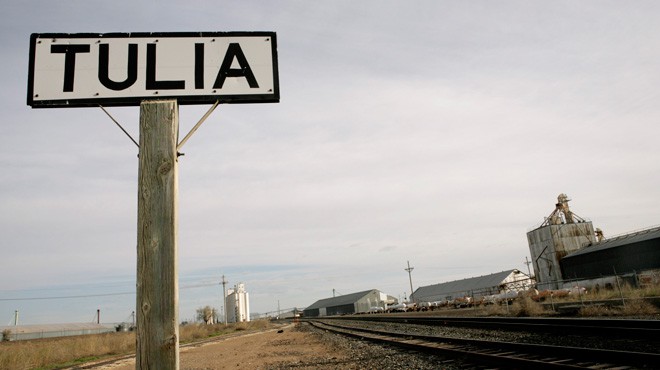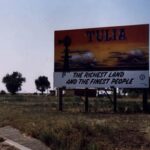
13 Nov TULIA TEXAS: A STORY OF INJUSTICE, AND MASS INCARCERATION
TULIA TEXAS: A STORY OF INJUSTICE, AND MASS INCARCERATION
PART ONE-IT HAPPENED IN A SMALL TOWN
Note to the reader: What happened in Tulia is an expose’ of sorts. It’s a story of the fallacy of the “War on Drugs”, militarization of our police forces, propaganda, fear, injustice, cover-up, and inherent racism. However, I think Tulia is more about the collective “us”. I was always taught that a mistake is just an opportunity to learn. What can be learned from Tulia?
RAID
Dawn was breaking over the panhandle town of Tulia, Texas. Just as the deep reds and sherbet oranges of sunrise were beginning to break over the purple black prairie darkness, several men began to surround a one bedroom, run down residence in Tulia’s black part of town. The men bore the initials and identifications of their various agencies in big bold fluorescent yellow letters on their backs. The same scene was playing out all over the black part of town, in front of other homes, in which black residents were sleeping.
This particular home was that of 56 year old, Joe Welton Moore, or “Bootie Wootie” as he was known to his friends. Joe was a long time resident of Tulia, first arriving with his family in the 1950s. Joe was a hog farmer, and like most of Tulia’s black residents he lived in what a tactful person would call “modest accommodations”, and a truthful person would call “ramshackle” home. He was one of the few black residents in town that owned a car, an older model Buick with heavy rust damage and bald tires. A large man, over 300 pounds, Joe was still asleep, when the armed men approached the small dilapidated porch of his home.
“Ok on three, then go.”
“One…two…three! Go! Go! Go!”
With that the two lead men swung a cylindrical ram into the door just above the locking mechanism. The door itself, being of poor quality, splintered and crack upon the initial impact, allowing the following members to look into the cramped quarters of the residence. With large caliber machine guns at the ready, the men quickly swept into the residence and then into the bedroom.
In the bedroom they found, Joe. The large man was coming out of a deep sleep, clad only in his underwear, and a very surprised and fearful look on his face. There, amid the clutter, on a mattress thinned and worn by years of use, in a stained pair of boxers, sat the Kingpin of Tulia.
THE RICHEST LAND AND THE FINEST PEOPLE
Tulia, Texas is the seat of Swisher County in the Texas handle. It is located about halfway between Amarillo and Lubbock on I-27. A town of approximately 5,000, Tulia is said to be more populated by cattle than people, a nod to its agrarian culture. Originally settled as a ranch, Tulia noticed a substantial spike in population when it was connected to the Santa Fe line in 1906.
Starting in the late 1940s black sharecroppers from East Texas began to migrate to little towns in search of steady work and a better life. Tulia was one of those little towns. As the population of workers began to swell in Tulia, so was the need for housing. The farmers began to build larger houses (four bedroom, or more), and their existing modest homes were being jacked up and hauled to an area on the west side of the tracks. When the small homes and shacks ran out, railway cars were converted into living quarters. The community that came as a result, was called the Sunset Addition.
A lack of heat in the winter and air condition in the summer was just one of the many drawbacks of living in the Sunset Addition. Residents had to share two simple spigots for drinking, washing, and bathing water among their population of 400 or more; a number that could grow to over 1,000 on the weekends when families from all over the panhandle converged on “Sunset” to dance, drink, and play poker at the bootleg bars that had sprung up on Front Street. However, older members of the community today actually recall “Sunset” with great fondness.
Because of the plentiful work, people had a few more dollars in their pocket, and some enterprising residents made money of the side as loan sharks, card sharks, and bootleggers. Other residents found ways to make extra money by legitimate means as well, by buying and flipping beat-up trucks, and organizing work crews for white farmers.
“Sunset” could be a violent place. Swisher County only had four officers in 1950, and they tended to allow the residents of “Sunset” to handle their own justice. As a result nearly every killing would be officially ruled as self-defense. Workers were needed, and the work was steady. Typically if a field hand was arrested for fighting or gambling, his white boss would tell the Sheriff to cut him loose, the hand was needed more in the field than the jailhouse.
“Sunset” was clearly established under Jim Crow. The addition was separated from the whites in every possible way. A school existed that educated children up to the eighth grade, it was thought that black folks had no need for education beyond junior high. Black maids would cross the tracks every day to work in the white homes, but would return home before dark. After all, they called it “Sunset” for a reason.
Beginning in 1975, the agricultural economy of Swisher County began to unravel. The mid-seventies brought a drop in commodity prices, while production costs skyrocketed. The Ogallala Aquifer began to dry up, resulting in the inability to properly irrigate the otherwise hard dusty earth. Some of the wealthy farm owners bought up the arable that did exist, and hundreds of other families gave up moved to town or left all together. The black residents of “Sunset” had few options. The places that they may have the money to migrate to were experiencing their own troubles.
By 1970, Tulia’s school had been fully integrated. The white residents of Tulia weren’t that upset with this; this was Texas, and the black kids were good for the sports program. Gifted athletes, regardless of color, were celebrated by the local community, and for many of the families in “Sunset” it became an opportunity. Graduation, black or white, generally meant one thing, leaving town. There were no jobs in Tulia.
By 1999, conditions had actually improved for Tulia’s black residents. “Sunset” had been condemned and bulldozed so former white farmers could cash in on HUD money and FHA loans. Low income housing wasn’t pretty, but it came with showers, bathtubs, flush toilets, heat in the winter and, come summer, a second-hand window unit to cool the residents. However, make no mistake about it, Tulia’s black residents were always more of a commodity of the town than a part of it. When times were good, or their presence was economically beneficial to Tulia, or they were scoring points for the local sports teams, then the white residents saw them as an asset to the community. But, when crime occurred, or pretty white girls began to take interest in the athletic boys who lived on the other side of the tracks, the source of such a nuisance was all too easy to pinpoint. This would make the typical reactions of white residents to the events of the summer of 1999 all too predictable.
GEARING UP FOR WAR
In order to conduct a proper war you must have three things. First, you need money. The so-called “War on Drugs” in America was in full swing in the 1990s. Money had been raining down from the federal government to law enforcement agencies across the country to conduct operations against the drug dealers and criminals that were choking the life out of the decent law abiding populace. At the same time the government was profiting off the war itself, by cutting international side deals through CIA operatives and the real “movers and shakers” in the illegal narcotics trade. It was small town America that was always the intended target audience for the propagandists, and add a little “walking around” money into the equation and you get full on nationalistic pride in the fight against our own ie., the local hustler.
In an effort to target street-level dealers, local drug task forces would be distributed federal dollars to hire undercover officers to make drug busts. The Panhandle Narcotics Task Force received just those kind of funds and distributed them to counties and agencies within the jurisdiction. One such agency was the Swisher County Sherriff’s Department, which was ran by Sherriff Larry Stewart. It would be Stewart in cooperation with the task force that sought the services of undercover agent Tom Coleman.
Second, you need soldiers. The militarization of America’s police forces can be directly linked to the “War on Drugs”. As American television watchers were shown a seemingly endless barrage of stories of armed brutes with automatic weapons pushing their deadly commodities across the country, they called for arming local police forces with the equipment necessary to go to war. Black military garb and the accompanying weapons and armed transportation began to replace the crisp, friendly, sky blue uniforms of a forgotten past. Weapons training, SWAT tactics, and control gadgetry, replaced the helpful small town Andy Griffin style of law enforcement.
Officers began to train in “undercover programs”, learn about “drug behavior”, and count arrests as more of an accomplishment than a necessity. This led to a new concept the “professional undercover officer”. Tom Coleman was hired by Sherriff Stewart for just this reason. They needed an outsider for such a tight-knit small community like Tulia. They needed someone that nobody knew that could get in there and root out the dealers, and Tom Coleman was their guy, after all, he was the son of a Texas Ranger.
Finally, you need an enemy. You can’t have a war without an enemy. In a town the size of Tulia (5,000) the enemy lines are pretty clear. Tulia had to have a drug problem, just turn on the TV, the whole damn country has a drug problem, and we’re at war over it. Well if it’s not your neighbors that are dealing all the drugs, it’s gotta be somebody, and it’s gotta be coming from somewhere. Where do bad things usually come from in small towns? From across the tracks.
THE LAWMAN COMETH
Tom Coleman was the son of Joe W. Coleman, a storied Texas Ranger. In the case of the younger Coleman, one could say after the apple fell from the tree it must have rolled down a hill into a valley and up the other side. This was a clear case that fine Texas lawman stock doesn’t necessarily guarantee that it will pass from one generation to the next.
Regardless, young Tom wanted to be every bit the lawman that his daddy was. After earning his G.E.D. in 1986 he embarked on a career in small-town law enforcement. Coleman would have a rocky 12 years as a jailer and sheriff’s deputy in Pecos, a jailer in Denton County, and a sheriff’s deputy in Cochran County. Both of his stints as a deputy would end abruptly with Coleman suddenly leaving town, without notice and thousands of dollars in debt.
In an article for the Austin Chronicle, writer Nate Blakshee, found some that were willing to talk about Coleman’s previous postings. “According to an officer (who requested anonymity) who served with Coleman in Pecos County for several years, Tom developed a reputation as unstable and untrustworthy. ’He was a nut,’ the officer said. Coleman was in the habit of carrying as many as three guns on his person at one time, says the officer. On one occasion, according to Pecos County chief deputy Cliff Harris, Coleman accidentally shot out the windshield of his own patrol car with a shotgun while he was seated in the car.” (The Austin Chronicle)
Others, including Coleman’s ex-wife, described him as “paranoid” and a “compulsive liar”. Shortly after Coleman’s second child was born, he found himself deeply in debt, and one day he just took off. He wrote a note to his employer, the sheriff, blaming his troubles on his wife, placed his son in the family car, pawned a gun for gas money and took off for Sherman, where his mother lived.
After a brief stint as a jailer in Denton, Coleman went to Cochran, Texas where he was hired as a deputy. That ended in 1996 when Coleman walked into the dispatcher’s office in the middle of his shift and told her he was leaving. Again, he gave no notice to his employer, and claimed he was leaving for reasons related to a woman, his girlfriend at the time.
About a year after Coleman had left town a theft charge was filed against him. The basis for the charge was that another employee had observed him using the county’s credit card to put gas in his personal vehicle. However, it seems what really caused his former employer to seek a warrant was Coleman’s former debts. The Sheriff received letters from merchants in the community that were owed outstanding balances. They included the grocer, mechanic, Gas Company and others. A deal was worked out that Coleman would repay the vendors and in exchange the theft charge would be dropped.
By this time Coleman had moved on. He had found work with the Panhandle Drug Task Force. He attended and completed an 80-hour course on undercover work with the Drug Enforcement Administration and spent a number of weeks training with the task force. Sheriff Stewart hired Coleman to come to Tulia, assume the role of streetwise drug probationer, T.J. Dawson, and make as many drug buys as he could.
About five months into the eighteen month investigation, Sheriff Stewart appears to have become aware of Coleman’s warrant. The Sheriff had no choice but to arrest Coleman and request a bond. However, he wasn’t fired, he was just temporarily suspended until his problem was resolved. To this day it is unclear where the lawman suddenly obtained the nearly $7,000.00 he owed to the good citizens of Cochran County. His undercover salary was only $23,000.00. He has made several claims, the most recent being that his mother loaned him the money, regardless he paid it off and continued his undercover work.
Coleman found it hard to infiltrate the local drug scene at first. He was regarded as an outsider and not trusted by any of his assumed targets. According to Coleman that changed when he landed a job bailing hay at the Tulia Sale Barn. Coleman befriended 65-year-old Eliga Kelly, a black man whose poverty required him to do manual labor. Coleman bought Kelly lunch, helped him with his share of the work, and eventually began to make social calls.
Coleman claims that within a short period of time he was buying drugs, and always the same drug, expensive powder cocaine. The only evidence of these transactions is the memory of Coleman himself. He did not wear a recording device, he worked alone, and he didn’t keep track of the transactions other than by writing them on his arm or leg; a practice that would later come under a great deal of scrutiny.
Over the course of the next year Coleman (or T.J. Dawson) was buying eight balls of cocaine by the bushel basket full. Strangely enough none of the expensive powder cocaine was ever turned over to law enforcement officials or a lab for testing, which would have not been required under Texas criminal law at the time. By the time it was all said and done, Coleman had purchased drugs from 46 dealers, 40 of whom were black. He submitted his final report to Sheriff Stewart, warrants were requested and issued, and plans were drawn up. The lawmen were going to serve all of the warrants in one big sweep, and clean up the streets of Tulia once and for all.









No Comments